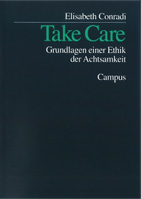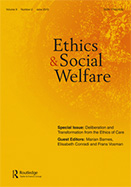Books
Paying Attention – Core Concepts in the Ethics of Care
Elisabeth Conradi, Frans Vosman (ed.): Praxis der Achtsamkeit. Schlüsselbegriffe der Care-Ethik. Frankfurt am Main, New York: Campus 2016.
In Europe, the ethics of care gains more and more importance in the last years. The book opens up new perspectives by presenting this transnational and transdisciplinary development. It presents quite a number of care-ethical core concepts and reflects on their involvement with philosophical traditions. Ensuing from the practice of care and attentiveness it considers ways and means of societal transformation and types of responsibility. What is the ethico-political meaning of vulnerability? Is caring a fundamental political activity?

Cosmopolitan Civil Society: Inclusion by succesfull Practice
Elisabeth Conradi: Kosmopolitische Zivilgesellschaft. Inklusion durch gelingendes Handeln. Frankfurt am Main, New York: Campus 2011.
The book envisions how societal transformation can be performed and achieved by successful practice. It argues that it is possible to detect malpractice in form of discrimination that establishes or continues disrespect, resentment and intolerance. Following up the aristotelian eupraxia it further states that it is possible to identify three successful practices performed by civic alliances that establish models of recognition: Translating, reflecting and remembering. These practices have to be cultivated in order to keep up and improve the society.

Take Care: Foundation of an Ethics of Attentiveness
Elisabeth Conradi: Take Care. Grundlagen einer Ethik der Achtsamkeit. Frankfurt am Main, New York: Campus 2001.
In principle-based moral theory, care is conceptualized as a ‘surplus’ in opposition to a generally obligatory ‘minimal ethic.’ As an alternative, the book suggests to redefine care as a social practice which opens space for agency. Morality is explicated as an interactive process, where ‘attentiveness’ does not need to be based on autonomy but may be viewed as a result of care interactions. Hence, care interactions are situated between activity and relatedness, pointing towards the collective in place of the individual, moral judgement, and moral action.

The Human Condition: Plurality and work in the political thinking of Hannah Arendt
Tätiges Leben. Pluralität und Arbeit im politischen Denken Hannah Arendts. Edited by Elisabeth Conradi and Sabine Plonz. Bochum: swi 2000.
The book reflects on the question whether and how politics can be transformed by following Hannah Arendt’s political thinking. Can Arendt’s approach lead to a reconceptualisation of work? And can her emphasis on human plurality help to answer questions that occur through a simultaneity of equal rights and the continuance of societal marginalisation.
Journals
Marian Barnes, Elisabeth Conradi, Frans Vosman (ed.): Special Issue “Deliberation and Transformation: Challenges through the Ethics of Care”. Ethics & Social Welfare, Vol 9 Issue 2 (2015) >>
Articles in English
Elisabeth Conradi: Theorising care. Attentive interaction or distributive justice? International Journal of Care and Caring, pp. 25-42 (18) February 2020, Policy Press Print ISSN 2397-8821, Online ISSN 2397-883X, https://doi.org/10.1332/239788219X15633663863542
Elisabeth Conradi: Applying or Reinventing? The Ethics of Care and Social Work. In: Hoffman J., Baart A., Vosman F. (Hg.): The Ethics of Care. The State of the Art. Peeters: Leuven: 2020, Reihe: Ethics of Care, Bd. 8, S. 189-208, ISBN: 978-90-429-4063-5 http://www.peeters-leuven.be/boekoverz.asp?nr=11221
Elisabeth Conradi: Forgotten Approaches to Care: The Human Being as Neighbour in the German-Jewish Tradition of the Nineteenth Century. In: Franziska Krause, Joachim Boldt (ed.): Care in Healthcare. Reflections on Theory and Practice. London, UK: Palgrave & Macmillan 2018 (book) und Springer International Publishing AG (online with open access), https://link.springer.com/chapter/10.1007/978-3-319-61291-1_2
Elisabeth Conradi: Redoing Care: Societal Transformation through Critical Practice. In: Ethics & Social Welfare, Vol 9, Issue 2 (2015), 113-129, http://www.tandfonline.com/toc/resw20/9/2.
Elisabeth Conradi, Jorma Heier: Towards a Political Theory of Care. In: Gert Olthuis, Jorma Heier, Helen Kohlen: Moral boundaries redrawn. The significance of Joan Tronto’s argument for political theory, professional ethics, and care practice. Leuven: Peeters 2014, 29-50.
Christina Sommer, Margarete Boos, Elisabeth Conradi, Nikola Biller-Andorno, and Claudia Wiesemann: „Care and justice arguments in the ethical reasoning of medical students“. In: Ramon Llull Journal of applied ethics. January-December 2011, Vol 1, Issue 2, 9-32.
Elisabeth Conradi: Is Civil Society a European concept? The German example of Cooperative housing as a political source of civil society. In: Fatima Harrak, Irene Schneider, Yahia Abou El Farah: Perspectives et dynamique du développement de la société civile, Rabat 2009, 9-27.
Elisabeth Conradi: A lifelong student of Iris Young. In: American Political Science Association Annual Meeting (ed.): Tribute to Iris Marion Young. Edited by Kouslaa Kessler-Mata, Mara Marin, Deva Woodly, University of Chicago. Chicago and Philadelphia 2006, 28.
Conradi, E., Biller-Andorno, N., Boos, M., Sommer, C. and Wiesemann, C.: „Gender in medical ethics discourse: Re-examining the conceptual basis.“ Medicine, Health Care and Philosophy, 6 (2003) 1, 51-58.
Selected Articles in German
Self Care and Care for Others
Elisabeth Conradi (2020) Selbstsorge und Fürsorge. In: Susanne Hartwig (Hg.) Behinderung. Kulturwissenschaftliches Handbuch. J. B. Metzler Verlag, S. 119-124, https://link.springer.com/chapter/10.1007/978-3-476-05738-9_21
Co-Humanity and communitarianism in modern Jewish social ethics
Elisabeth Conradi (2018) Mitmenschlichkeit in der modernen jüdischen Sozialethik. Elemente kommunitarischen Denkens bei Martin Buber, Käte Hamburger und Hermann Cohen. In: Handbuch Kommunitarismus. Hg.v. W. Reese-Schäfer, Wiesbaden: Springer, https://link.springer.com/referenceworkentry/10.1007%2F978-3-658-16864-3_8-1
Two Strands of Theorizing Care: Attentive interaction or distributive justice?
Elisabeth Conradi (2016) Verteilungsgerechtigkeit oder achtsame Zuwendung? Über die Ausrichtung deutsch¬sprachiger Care-Diskurse. In: Das Argument 320, 58. Jahrgang, Heft 6, S. 818-832.
The Ethics of Care between Philosophy and Social Theory
Elisabeth Conradi: Die ‚Ethik der Achtsamkeit‘ zwischen Philosophie und Gesellschaftstheorie. In: Elisabeth Conradi, Frans Vosman (ed.): Praxis der Achtsamkeit. Schlüsselbegriffe der Care-Ethik. Frankfurt am Main: Campus 2016, 53-86.
Paying Attention – Core Concepts in the Ethics of Care
Frans Vosman, Elisabeth Conradi: Einleitung – Schlüsselbegriffe der Care-Ethik. In: Elisabeth Conradi, Frans Vosman (ed.): Praxis der Achtsamkeit. Schlüsselbegriffe der Care-Ethik. Frankfurt am Main: Campus 2016, 13-30.
Ethics & social work
Elisabeth Conradi: Ethik im Kontext sozialer Arbeit. In: EthikJournal 1. Jg. 2013a, Ausgabe 1, April (www.ethikjournal.de), Seite 1-19, ISSN 2196 – 2480, http://www.ethikjournal.de/archiv/ausgabe-12013/
Reconstructive study of sources and post-reception
Elisabeth Conradi: Rekonstruierendes Quellenstudium und Nachrezeption: Wie die politische Ideengeschichte zu bereichern ist. In: Reese-Schäfer, Walter; Salzborn, Samuel (ed.): „Die Stimme des Intellekts ist leise“. Klassiker/innen des politischen Denkens abseits des Mainstreams, Baden-Baden: Nomos 2015, 85-111.
Constantin Brunner‘s analysis of antisemitism
Elisabeth Conradi: Die „Antisemitenfrage“ bei Constantin Brunner. In: Gerhard Lauer, Jürgen Stenzel, Irene Aue-Ben-David (ed.): Constantin Brunner im Kontext. Ein Intellektueller zwischen Kaiserreich und Exil. München: De Gruyter 2013, 230-253.
Societal transformation through everyday Communication. The Cultivation of Debate in Deliberative Democracy
Elisabeth Conradi: Gesellschaftlicher Wandel durch alltägliche Kommunikation. Die Kultur der Debatte in der deliberativen Demokratie. In: Peter Niesen (ed.): Zwischen Demokratie und globaler Verantwortung. Iris Marion Youngs Theorie politischer Normativität. Baden-Baden: Nomos 2013, 135-150.
Societal transformation bei practice
Elisabeth Conradi: Gesellschaftlicher Wandel durch Andershandeln und die politische Strategie der Differenz. In: Dominique Grisard, Ulle Jäger, Tomke König (ed.): Verschieden sein. Nachdenken über Geschlecht und Differenz. Sulzbach/Taunus: Helmer 2013, 107-118.
Voting rights for everybody? The belonging to the demos as a challenge for political theory
Elisabeth Conradi: Wahlrecht für alle? Die Zugehörigkeit zum demos als politiktheoretische Herausforderung. In: Lino Klevesath (ed.): Demokratie – Kultur – Moderne. Perspektiven der politischen Theorie. München: Oldenbourg-Verlag 2011, S. 133-146.
Article (pdf) >>
Self-determination through care and attentiveness
Elisabeth Conradi: Selbstbestimmung durch Achtsamkeit. In: Vera Moser, Detlef Horster (ed.): Menschenrechte, Menschenwürde, Behinderung. Grundlegung einer Ethik der Behindertenpädagogik. Stuttgart: Kohlhammer Stuttgart: Kohlhammer 2012, 167-183.
Civil Society and Democracy: Reflecting on democratic Decisions on regional Infrastructure Policies and the part of Civil Disobedience
Elisabeth Conradi: Zivilgesellschaft und Demokratie. Demokratietheoretische Überlegungen zum Konflikt um das Infrastrukturprojekt ‚Stuttgart 21‘. In: Zeitschrift für politische Theorie, Jahrgang 1 (2010) Heft 2, 221-232.
Article (pdf) >>
Ethics and Politics: How an ethics of care can be a source of political responsibility
Elisabeth Conradi: Ethik und Politik. Wie eine Ethik der Achtsamkeit mit politischer Verantwortung verbunden werden kann. In: Hartmut Remmers, Helen Kohlen (ed.): Bioethics, Care and Gender. Herausforderungen für Medizin, Pflege und Politik. Universitätsverlag Osnabrück: Vandenhoeck & Ruprecht 2010, 91-117.
Inclusion into Democratic Deliberation Processes: from Social to Political Practice
Elisabeth Conradi: Inklusion in demokratische Debatten – von der sozialen zur politischen Praxis. In: Neue soziale Bewegungen: Forschungsjournal. Stuttgart: Lucius & Lucius, Heft 4, 2008, 2-86.
Hannah Arendt as an intellectual and the controversy about her book „Eichmann in Jerusalem“
Elisabeth Conradi: Hannah Arendt als Intellektuelle und die Kontroverse um „Eichmann in Jerusalem“. In: Harald Bluhm, Walter Reese-Schäfer (ed.): Die Intellektuellen und der Weltlauf. Schöpfer und Missionare politischer Ideen in den USA, Asien und Europa nach 1945. Baden-Baden: Nomos 2006, 75-93.
Article (pdf) >>
Intuitive reasoning and critical practice. Fundaments of a professional ethics in nursing and social work
Elisabeth Conradi: Intuitiver Verstand und kritische Praxis. Grundlagen einer Ethik helfender Berufe. In: Hans U. Dallmann, Thomas Kreuzer (ed.): Gutes Gelingen. Münster: Lit 2006, 245-259.
Gender in medical ethics discourse: Re-examining the conceptual basis
Elisabeth Conradi, Nikola Biller-Andorno, Margarete Boos, Christina Sommer, Claudia Wiesemann: Género en la ética médica: revisión de la base conceptual de la investigación empírica. In: La Vieja, Teresa López de; Barrios, Olga; Figueruelo, Ángela; Velayos, Carmen; Carbajo, Judith (ed.): Bioéthica y feminismo. Estudios multidiciplinares de género. Salamanca: Ediciones Universidad de Salamanca 2006, 57-70.
The household as a source and space of civil society. The political economy of Cooperative housing
Elisabeth Conradi: Der Haushalt als Raum der Zivilgesellschaft. Zur politischen Ökonomik der Wohngemeinschaft. In: Vorgänge. Zeitschrift für Bürgerrechte und Gesellschaftspolitik, Nr. 170; Rückkehr der Bürgerlichkeit, 44. Jahrgang (Juni 2005) Heft 2, 80-86.
From the particular to the general: Attentiveness in nursing as a starting point for an ethic
Vom Besonderen zum Allgemeinen. Zuwendung in der Pflege als Ausgangspunkt einer Ethik. In: Wiesemann, Claudia; Erichsen, Norbert; a.o. (ed.): Pflege und Ethik. Leitfaden für Wissenschaft und Praxis. Stuttgart: Kohlhammer 2003, 30-46.
Difference as a stigma or as an honor? Hannah Arendts argument about the ambivalent life at the margin
Anderssein als Makel oder Auszeichnung? Hannah Arendts Thesen zur widersprüchlichen Existenz am Rande der Gesellschaft. In: Elisabeth Conradi, Sabine Plonz (ed.): Tätiges Leben. Pluralität und Arbeit im politischen Denken Hannah Arendts. Bochum: swi 2000. 21-43.
Women’s struggle for language and representation. Margarete Susman about gender relations
Der Kampf der Frau um Sprache und Bild. Margarete Susman über das Geschlechterverhältnis. In: Renate Heuer, Ralph-Rainer Wuthenow (ed.): Gegenbilder und Vorurteil. Aspekte des Judentums im Werk deutschsprachiger Schriftstellerinnen. Frankfurt/Main, New York: Campus 1995, 60-188.
Is the Exclusion of Women a basic element of traditional Democratic Theory? How is the Exclusion of Women legitimated?
„Ist der Ausschluß von Frauen für die traditionellen Demokratietheorien grundlegend und wie wird er gerechtfertigt?“ In: Feministische Studien 7. Jg (1989) Nr. 2, 85-98.


